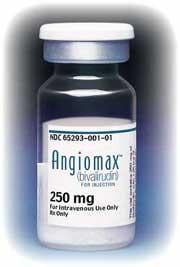
December 10, 2009 – European approval was recently granted for the use of Angiox (bivalirudin) as an anti-coagulant in patients with ST-segment elevated myocardial infarction (STEMI) who undergoing emergency primary percutaneous coronary intervention (PCI).
The commission decision extends the current EU license for Angiox and is applicable to all member states of the European Union. The manufacturer, The Medicines Company, said it will launch Angiox for the new indication in January 2010.
The approval was based on the landmark HORIZONS-AMI study, which was the first drug trial to demonstrate a reduction in deaths from heart attacks in patients undergoing emergency PCI. The trial showed that patients treated with Angiox compared with today’s leading treatment - heparin plus a platelet glycoprotein IIb/IIIa inhibitor (GPI) – were more likely to survive and had less frequent severe bleeds.
“The HORIZONS trial is the most recent demonstration of the efficacy of bivalirudin and shows a remarkable reduction of mortality in patients with STEMI undergoing primary PCI,” said professor Christian Hamm, director of the department of cardiology and medical director, Kerckhoff Heart and Thorax Center, Bad Nauheim, Germany. “The robustness of these findings from this trial is impressive and reflects a landmark in the treatment of these high risk patients in Europe.”
The HORIZONS-AMI trial compared Angiox to heparin plus a GPI in 3,602 patients (57 percent of whom were recruited in Europe) presenting with the most severe form of heart attack, known as STEMI, undergoing a PCI.
Results at 30 days showed that Angiox significantly improved overall mortality including a reduction in the incidence of heart-related deaths by 38 percent, reduced the incidence of major bleeding by 42 percent and significantly reduced the incidence of net adverse clinical events by 26 percent. The drug also demonstrated comparable rates of major adverse cardiac events (5.4 vs. 5.5 percent).
Angiox is a direct thrombin inhibitor with a naturally reversible mechanism of action and 25 minute half-life. In clinical trials.
For more information: www.themedicinescompany.com


 January 05, 2026
January 05, 2026 









